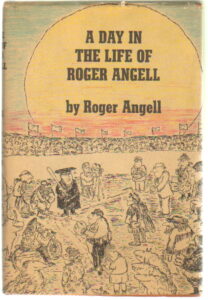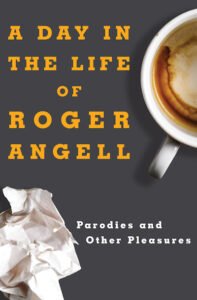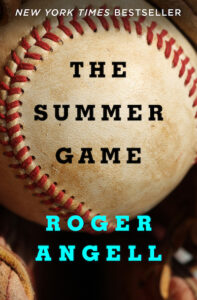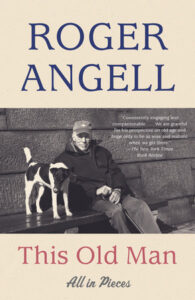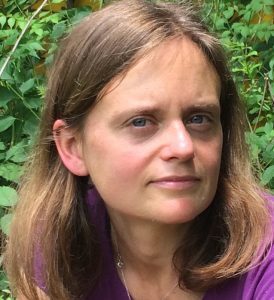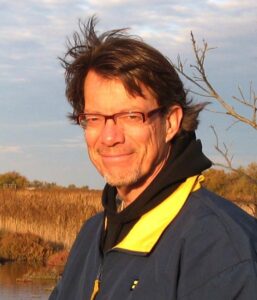Baron Wormser: The Road Washes Out in Spring
October 7, 2023 by David
Filed under Non-Fiction, WritersCast
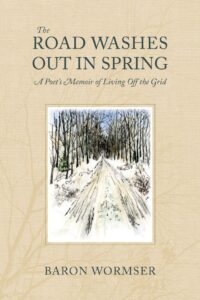 The Road Washes Out in Spring: A Poet’s Memoir of Living Off the Grid – Baron Wormser – Brandeis University Press – 9781684581603 – 214 pages – paperback – $24.95 – March 7, 2023 – ebook versions available at lower prices
The Road Washes Out in Spring: A Poet’s Memoir of Living Off the Grid – Baron Wormser – Brandeis University Press – 9781684581603 – 214 pages – paperback – $24.95 – March 7, 2023 – ebook versions available at lower prices
Baron Wormser is a poet and prose writer whose work I have been familiar with for many years. Back in the 1970s, he and his wife Janet, moved to rural Maine as part of the “back to the land” wave that had been inspired by hippies and the Stewart Brand’s influential Whole Earth Catalog and especially the writings of the now almost mythic Helen and Scott Nearing, vegetarians who pioneered simple living in the 1930s and 40s.
His memoir of that time was originally published almost twenty years ago and now there is a new edition of this meditative, almost poetic narrative of simple living.
Baron and his family lived in a house they built in Maine with no electricity or running water. Much like the Nearings, they raised (and canned) much of their own food, carried water from their well, and read through the long winter nights by the light of kerosene lamps.
As Wormser states early in this book, living off the grid was not meant to be a statement of anything. In fact, as complete novices to the life they set out to live, it turned out that they had built their house in a place that there was no electricity and initially they could not afford to pay to have power lines run to their house. As time went on, they embraced the simplicity of their rural lives and learned from their experienced neighbors, for whom life was not a choice and “lifestyle” would have been a meaningless term.
Wormser refuses any simple understanding or explanation for the lives he and his wife chose for the twenty five year period during which they raised their children and became integral to the local community. He writes about nature and the simple life without sentimentalizing anything, appreciates the good and faces the difficulties head on without failing to note the complexity of everything we prefer to think of as simple. He is a careful thinker and writer, and his poetic self is a presence at all times. Here is a lovely excerpt from the book:
If there is such a thing as a mutable eternity, it is snow falling in the woods. I am thinking of a windless, steady plummeting. Nothing is moving except for snowflakes. You can hear the snow faintly ticking on the pine needle branches. You can hear it descending—a soft sift of air. You are held in the hand of something enormous yet gentle, something extraordinary yet calming, something evanescent yet quite palpable (from a Latin word meaning “to touch gently”). Every surface receives the snow in its way. A large, fallen, curled maple leaf collects the snow in its center. A boulder”s stored heat resists the snow at first. Then its surface turns wet as if it were raining. Then with un-boulder-like delicacy a thin frizz accumulates. On top of the garden gate a fragile white skein begins to perch. Little, almost derby-like hats grow on the garden fence posts. The mown grass around the house fills in gradually. The stiff, frozen blades seem like little heights. Then the snow, as it mounts, receives itself. Another landscape is created and for months we live in that landscape.
When I was in my twenties, I shared the impulse to “head for the country,” where I tried and failed to make a go of living on the land. I greatly admire and appreciate what the commitment that Baron and his family made to live in Maine for a quarter century. And it was a deep pleasure to read this memoir of that time.
In 2000 Baron was appointed Poet Laureate of Maine by Governor Angus King. He currently resides in Montpelier, Vermont, with his wife. In 2009 he joined the Fairfield University MFA program. He works in schools with both students and teachers. Wormser has received the Frederick Bock Prize from Poetry and the Kathryn A. Morton Prize along with fellowships from Bread Loaf, the National Endowment for the Arts and the John Simon Guggenheim Memorial Foundation. In 2000 he was writer in residence at the University of South Dakota. Wormser founded the Frost Place Conference on Poetry and Teaching and also the Frost Place Seminar. His most recent book of poetry is The History Hotel, published by CavanKerry Press.
In other rooms and beyond those rooms
So much was occurring that went on happily
And unhappily, indifferent to protocols,
Brimming with anemones, half-heard melodies,
Averted glances.
(from “Elegy for the Poet Adam Zagajewski”)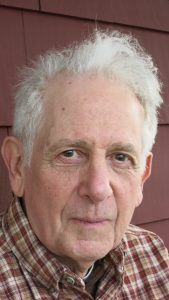
Buy The Road Washes Out in Spring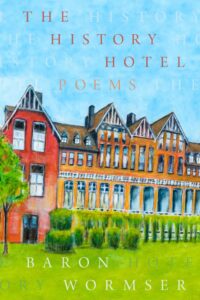
Podcast: Play in new window | Download
Cornelia Maude Spelman: Missing: A Memoir
October 25, 2022 by David
Filed under Non-Fiction, WritersCast
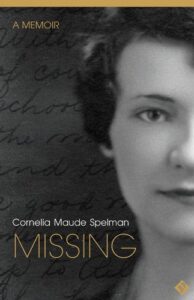 Missing: A Memoir – Cornelia Maude Spelman – Jackleg Press – 9781737513445 – Paperback – 176 pages – $17.00 – July 15, 2022 – ebook versions available at lower prices
Missing: A Memoir – Cornelia Maude Spelman – Jackleg Press – 9781737513445 – Paperback – 176 pages – $17.00 – July 15, 2022 – ebook versions available at lower prices
Cornelia Maude Spelman is best known as a children’s book author. This memoir of her family was spurred by her meeting with and friendship with the late New Yorker editor William Maxwell (himself an extraordinary writer as well), who knew her parents in the 1920s when they were at the University of Illinois together.
Cornelia plainly admired and enjoyed the company of Maxwell, but also was fascinated that he knew her parents before they had children, before their lives went in different directions than Maxwell’s. At one of her meetings with him, she suggests that her parents’ lives were not successful in the terms they had hoped for. Maxwell gently tells her that “in a good novel one doesn’t look for a success story, but for a story that moves one with its human drama and richness of experience.”
It was Maxwell who prompted Cornelia to explore and tell the story of her parents. This memoir tells that story. Spelman spent years exploring the history of her family. It’s a wonderful exploration, full of side trips and thoughtful reflections, and much that anyone interested in the mysteries of their family members will appreciate. Superman was luckier than most of us, in that she was able to meet with people who knew her parents when they were young. Most of us get interested in these stories far too late in our own lives to be able to talk to people who actually knew our older family members, or who, if still around, can remember anything meaningful to tell us.
Spelman’s research is extensive too. She goes to Iowa and Illinois to track down places and information details of her family history and to find people who know something about her parents and their parents. She recounts letters and interviews, even finding medical records and telegrams to help fill out stories that would otherwise be invisible or lost. Importantly Spelman is able to reconstructs her mother’s life and death, as well as that of her long lost brother. Cornelia’s writing is excellent and her storytelling compelling, so that even though we are not connected to the people about whom she writes, we can feel how she feels about them and about herself as she searches out and tells these “missing” family stories.
Cornelia is always honest with us about her disappointments, as well as what she learns that brings her joy and closure as well. This book is warm, profound, and honest. At the end, we know there is still much that will always be missing, but so much more that has been found.
Cornelia Maude Spelman, MSW, was a family therapist before she became a writer and artist. She’s written eleven books for children that help them manage emotions and difficult life situations. Her The Way I Feel series of books for young children has sold several million copies and been translated into Chinese, Korean, Spanish, Greek, Japanese, German, Arabic, Turkish, Danish, and Russian. Cornelia has earned awards from the Illinois Arts Council and was awarded the Bernard De Voto Fellowship in Nonfiction at Bread Loaf Writers’ Conference. This is her first book for adult readers.
It was truly a pleasure to speak with her about this book and her journey to write it.
Podcast: Play in new window | Download
Sarah Vogel: The Farmer’s Lawyer: The North Dakota Nine and the Fight to Save the Family Farm
April 14, 2022 by David
Filed under Non-Fiction, WritersCast
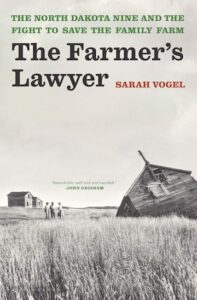 The Farmer’s Lawyer: The North Dakota Nine and the Fight to Save the Family Farm – Sarah Vogel – Bloomsbury – 9781635575262 – 432 pages – hardcover – $28 – ebook edition available at lower prices – November 2, 2021
The Farmer’s Lawyer: The North Dakota Nine and the Fight to Save the Family Farm – Sarah Vogel – Bloomsbury – 9781635575262 – 432 pages – hardcover – $28 – ebook edition available at lower prices – November 2, 2021
Many Americans think of North Dakota and the other prairie states as being conservative culturally and equally unprogressive politically. But that view of these predominantly farming states neglects their long histories of progressive populism that goes back over 100 years. That’s true of North Dakota where the Nonpartisan League was active and strong from the 1920s onward (and into the present, where it still exists as the Democratic NPL — much like the Democratic Farm Labor party in Minnesota that Hubert Humphrey represented.
That history provides the backdrop for Sarah Vogel’s true story in The Farmer’s Lawyer, which tells of a seemingly impossible-to-win legal battle, ironically against the US government agency that was established during the Depression to help family farmers, which by the 1970s was helping to destroy them. At the outset of the Reagan administration (Reagan was helped to be elected, ironically, by the support of midwestern farmers), family farmers of all sizes all across the country were experiencing the worst economic crisis since the Great Depression. Land prices, the backbone of farm economics, had gone down, while farm operating costs were up. and interest rates had skyrocketed. At the same time, in many areas, bad weather severely affected crop output.
Because of policies implemented by the Reagan administration, and growing bureaucracy in the Farmers Home Loan administration, many family farmers were being threatened with foreclosure.
At that time, Sarah Vogel, the daughter of a well known Nonpartisan League supporter and lawyer, was herself a young lawyer and single mother was in the process of leaving Washington, D.C., where she had been working for a government agency. Contacted by some desperate farmers from North Dakota who were on the verge of losing their farms, and inspired by her belief in the importance of family farms to American life, she agreed to represent these struggling clients who couldn’t afford to pay her.
In the midst of her own personal issues, but supported by her family and friends, Vogel brought a national class action lawsuit against the FHLA, which meant she would have to fight against the full force of the Reagan administration’s Department of Justice, in behalf of these family farmers’ Constitutional rights. As a young lawyer who had never privately practiced before, this was her first case!
This book tells the entire years-long saga in incredible detail, brought to life by Sarah Vogel’s writing skill and storytelling prowess. It’s difficult to imagine a true-to-life legal story that has nothing to do with murder or mayhem being a page-turner, but this book will keep you fully engaged throughout. And it will remind you of how difficult it is for “the little guys” to fight against entrenched bureaucracies, especially the Federal government. It is a heroic story for sure, and credits not only Sarah, but her father, and all the farmers she worked with, who would simply never quit, and whose stolidity made such a huge difference, not only to the outcome of their own case, but for many others that followed them.
This is a story about courage, justice, commitment, and belief in oneself. And it is important for us to be reminded that Americans can stand together for the good of all, especially now, when we can agree on virtually nothing. It is an inspiring journey I appreciated learning about. This is a terrific book, and I think we had a terrific conversation as well.
Sarah Vogel is an attorney and former politician whose career has focused on family farmers and ranchers. Vogel was the first woman in U.S. history to be elected as a state commissioner of agriculture. In 2006, the American Agricultural Law Association awarded her its Distinguished Service Award for contributions to the field of agriculture law, and Willie Nelson honored her at Farm Aid’s thirtieth anniversary in 2015 for her service to farmers. She is an advocate for Native American rights and lives in Bismarck, North Dakota.
“Sarah’s story, told in her unique voice, inspires me–and I’m sure it will inspire you–to fight for family farmers.” –Willie Nelson
Author website here.
Buy the book here.
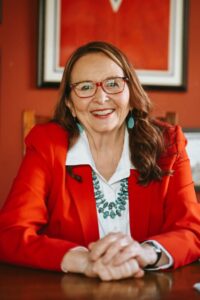
Podcast: Play in new window | Download
Susanne Paola Antonetta: The Terrible Unlikelihood of Our Being Here
August 11, 2021 by David
Filed under Non-Fiction, WritersCast
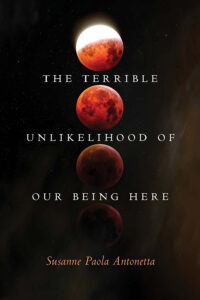 The Terrible Unlikelihood of Our Being Here – Susanne Paola Antonetta – 978-0-8142-5780-7 – 248 pages – paperback – February, 2021 – Mad Creek Books – $22.95 – ebook editions available at lower prices
The Terrible Unlikelihood of Our Being Here – Susanne Paola Antonetta – 978-0-8142-5780-7 – 248 pages – paperback – February, 2021 – Mad Creek Books – $22.95 – ebook editions available at lower prices
Sometimes one literally chances across a terrific book; it appears unbidden and takes over one’s complete attention. A surprise appearance in the daily maelstrom of life. This remarkable memoir by Susanne Paola Antonetta did just that for me, striking me like a lightning bolt out of the blue, and completely altering the trajectory of my thinking.
I’ve read alot of books and loved many of them. This book stopped me in my tracks. Reading it over the course of a few evenings, this author made me think and feel and understand another person’s experience, her deeply felt and beautifully described mind and being. That is quite an accomplishment and makes this a very special book indeed.
Antonetta brings us into her youth, the place of “Summerland” and her family’s life on the marshy border of the ocean in southern New Jersey. Like the descriptions of physics and astrophysics she intersperses between her memory pieces, her description of this place, the people in her family, and her own life are simultaneously dreamlike and definitive.
Her grandmother and mother are key figures throughout. And then she introduces her own experiences with bipolar disorder, drugs, and the trauma of electroshock treatment woven together with those brilliantly written descriptions of ideas in neuroscience and physics, and then there are her conversations with psychics and meditations on understanding their messages from inter-dimensional spaces. What a journey!
This is a memoir with great power and beauty, taking us into the past, the present and realms beyond, where ideas and perhaps the ground of being may or may not be found.
I won’t tell you much more about the book. I think you need to discover it for yourself. I loved it, and I really enjoyed speaking to Susanne as well. we had a terrific talk about this book and her writing.
This is a book I intend to re-read and work to understand more fully. Once is not enough.
“Antonetta tackles nothing less than consciousness and existence, employing an amalgam of science writing and mysticism. It’s hard to imagine another writer who could not only make such a project work but also make it seem natural and necessary.” —Robin Hemley, author of Borderline Citizen: Dispatches from the Outskirts of Nationhood.
Susanne Paola Antonetta is has written a number of books, including Make Me a Mother, Curious Atoms: A History with Physics, Body Toxic: An Environmental Memoir, A Mind Apart: Travels in a Neurodiverse World, a novella, and four books of poetry. Her work has been published in a variety of newspapers and magazines, including the New York Times, the Washington Post, Orion (one of my favorite magazines), the New Republic, and others. She lives in Bellingham, Washington.
Visit Susanne’s website for more information about her and her work.
You can buy the book from Bookshop.org.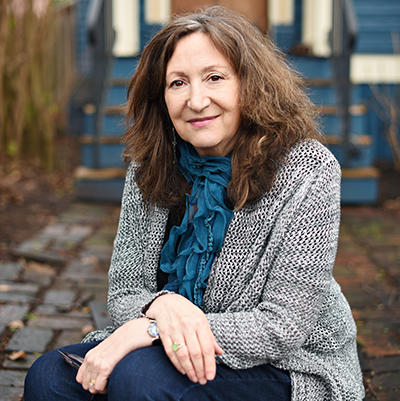
Podcast: Play in new window | Download
Writerscast: David Wilk interviews Roger Angell
October 1, 2020 by David
Filed under Non-Fiction, WritersCast
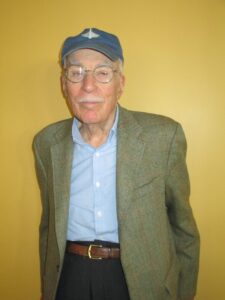 A couple years ago, in the process of researching the mostly unknown and under-appreciated New Yorker writer Robert M. Coates, I reached out to Roger Angell, who knew Coates during his many years of writing for and working at The New Yorker (and whose mother, Katharine Sergeant Angell White, and stepfather, E.B. White, knew Coates well from the earliest days of the magazine in New York and elsewhere). I wanted to learn as much as I could about Coates, and in the process, had the distinct pleasure of talking to one of the greatest writers of our time.
A couple years ago, in the process of researching the mostly unknown and under-appreciated New Yorker writer Robert M. Coates, I reached out to Roger Angell, who knew Coates during his many years of writing for and working at The New Yorker (and whose mother, Katharine Sergeant Angell White, and stepfather, E.B. White, knew Coates well from the earliest days of the magazine in New York and elsewhere). I wanted to learn as much as I could about Coates, and in the process, had the distinct pleasure of talking to one of the greatest writers of our time.
After telling me some interesting first-hand remembrances of Coates, Roger was kind enough to sit or an in-person interview with me in his apartment in New York along with his wife Peggy Moorman. It’s my honor to publish this interview now to celebrate Roger Angell’s 100th birthday. His prodigious, meticulous, and far-ranging memory is a match for his remarkable abilities as a writer.
Roger has always lived in New York City, and spent summers in Brooklin, Maine. He graduated from Pomfret School and Harvard University, served in the Air Force in World War II, first as an instructor in machine guns and power turrets, and then, in the Pacific, as an editor and reporter for the GI magazine Brief.
In 2014 Roger was inducted into the writers’ section of the Baseball Hall of Fame, and then in 2015 he was deservedly elected to the American Academy of Arts and Letters.
It is impossible to speak about and with Roger Angell without mentioning his writing about baseball, for which he is best known, including the classic books, The Summer Game and Five Seasons: A Baseball Companion, as well as a number of great shorter pieces that appeared first in the The New Yorker.
Angell’s earliest published works of short fiction and personal narratives. Several of these pieces were collected in early books, The Stone Arbor and Other Stories (1960) and A Day in the Life of Roger Angell (1970).
Roger first contributed to the The New Yorker in March 1944. He began writing about baseball in 1962, when William Shawn, then the editor of The New Yorker sent him to Florida to write about spring training and over the course of several decades produced some of the best baseball books ever written, inspiring countless readers with his brilliant descriptions of baseball games and players, and of course, fans of the game.
In a review of Once More Around the Park for the Journal of Sport History, Richard C. Crepeau wrote that “Gone for Good”, Angell’s essay on the career of Steve Blass,”may be the best piece that anyone has ever written on baseball or any other sport”.
While Angell has been praised fulsomely for his baseball writing, I’d prefer to think of him as simply one of the better literary stylists of our time. Listening to Roger Angell talk about books, writers and his writing life was one of the great pleasures of my own literary life, which I am pleased to share with you here.
Roger turned 100 on September 19, 2020. Happy Birthday Roger! And thank you and Peggy, for giving me the opportunity to speak with one of my literary heroes.
“Angell writes about baseball the way M.F.K. Fisher did about food, as a metaphor for life’s complexities of desire, defeat, utility and beauty.” — Phillip Lopate
This article in The New Yorker by David Remnick – “Roger Angell Turns 100” – is a must-read piece.
7 Must-Read Roger Angell Books: Legendary essays on baseball, reflections on aging, and so much more. Stephen Lovely, The Archive. 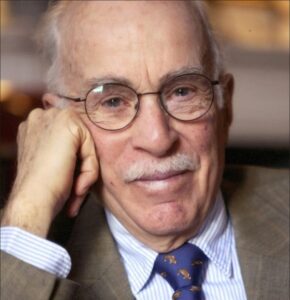
List of Roger Angell’s Books
A Day in the Life of Roger Angell
Five Seasons: A Baseball Companion
Game Time
Late Innings
Let Me Finish
This Old Man: All in Pieces
Once More Around the Park: A Baseball Reader
A Pitcher’s Story: Innings with David Cone
Season Ticket
Selected Shorts: Baseball, a Celebration of the Short Story
The Summer Game
Roger Angell Day – Celebrating Roger Angell – a 100th birthday celebration was held at the Friend Memorial Public Library in Brooklin, Maine, August 8, 2020 Photo by Bill Ray
Podcast: Play in new window | Download
Helen Zuman: Mating in Captivity [A Memoir]
September 8, 2020 by David
Filed under Non-Fiction, WritersCast
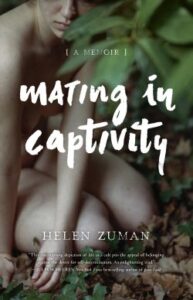 Mating in Captivity: A Memoir – Helen Zuman – 9781631523373 – She Writes Press – paperback – 248 pages – May 8, 2018 – $16.95 – ebook versions for sale at lower prices
Mating in Captivity: A Memoir – Helen Zuman – 9781631523373 – She Writes Press – paperback – 248 pages – May 8, 2018 – $16.95 – ebook versions for sale at lower prices
When I was in my younger hippie Whole Earth Catalog reading period of life, I became intensely interested in communes and alternative social structures, what are now often called “Intentional Communities.” Such utopian constructs have been in existence in America for many years (think about the Shakers in the 19th century) and the dream of a better way of living together than nuclear families persists to this day. I spent a couple summers on a working farm commune in Oregon, and over the years have studied and thought about the challenges and rewards of these communal work and living communities. Given the stresses that modern corporate capitalism places on individuals and families, it makes sense for us to explore different structures, despite the complexities of living together after the common experience of growing up in much narrower family units.
When Helen Zuman graduated from Harvard, searching for a better way to live, she too wanted to learn about and explore alternative intentional communities. After considering a variety of options, and getting a fellowship to study alternative structures, she moved to the North Carolina-based Zendik Farm in 1999. Initially she was unsure of whether it would be the right place for her, but it did not take her long to feel that she belonged. She gave the commune all her money and made the commitment to become a full time, permanent member of what she believed was a meaningful alternative to what the members called “dealthculture” – meaning anyone outside of the group itself. For her, as a inexperienced social being, the Zendik experience, based on sharing work, love, life and sex, made sense. But it turned out that the lived experience of the farm commune was not quite what it seemed, and without realizing it, Helen had become a member of a personal cult run by Arol, the Farm’s matriarch, who manipulated and controlled the members to meet her own needs at the expense of all else. Mating in Captivity is an illuminating and compellingly personal story of how a person can become a member of a cult, so simple, and then how one can escape, so difficult.
It’s ironic that the widespread desire for redefining social structures created by the tensions of modern capitalism has so often led to such fraught and misshapen group think. But Helen’s story is actually an optimistic one, as she was able to come through this experience and to make a life for herself that is, in fact, meaningful and defining outside the narrow structures laid down for us by the imperatives of industrial life.
This is Helen Zuman’s raw and honest confession and exploration of how a cult works and what it takes for an individual to escape one, and become her truer self. Mating in Captivity shows how cults work and both why people join and how they must escape in order to grow into fully functioning beings. I really admired her honesty throughout, and her storytelling is adept and strong. It’s a terrific memoir and one that readers of all kinds will appreciate.
Despite the ways in which things go off the tracks for us all too often, we can and must hope that a meaningful form of communalism is possible. If humans are going to live sustainably on this planet, it is likely a necessary adaptation for us to make.
“Just as the Zendik community, a cult, pulled Helen Zuman in and held her, her account of her time there will pull you in and hold you. Her clear-eyed observations of her fellow idealists—and of herself—are honest, compelling, and sophisticated.”
–Daniel Menaker, author of My Mistake: A Memoir
“How timely, how telling this story of an inexperienced young woman who fell prey to a cult because of the abuse to which she’d been subjected by male strangers. Only within the fold, where there were rules protecting the women, did she feel safe enough to explore her sexuality and learn to love. So she surrendered her possessions, her will, her youth. Read Mating in Captivity as a cautionary tale, one I hope will spark a desire to create a better world for our daughters.”
–Leah Lax, author of Uncovered: How I Left Hasidic Life and Finally Came Home
Mating in Captivity, which she calls “a cult memoir for smart people” is Helen’s first book. It was named a Kirkus Best Indie Memoir of 2018, was a finalist in Creative Nonfiction for the Community of Literary Magazines and Presses’ 2019 Firecracker Award, and was both first runner-up in memoir and a finalist for First Horizon and Grand Prize honors in the 2020 Eric Hoffer Awards. Other work has appeared in The New Farmers Almanac, in Communities and Livelihood magazines, and on the Foundation for Intentional Community’s website. She was born in London and raised in Brooklyn, and with her husband, Helen currently homesteads near the Hudson River in Beacon, New York.
Helen and I had a terrific and broad ranging conversation. I also recommend reading her post, linked above at the Foundation for Intentional Community site.
Buy the book on Bookshop.org and support independent bookstores!
Podcast: Play in new window | Download
Fenton Johnson – At the Center of All Beauty: Solitude and the Creative Life
June 14, 2020 by David
Filed under Non-Fiction, WritersCast
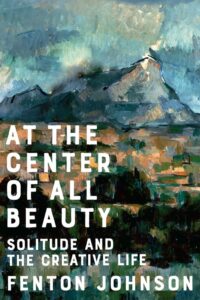 At the Center of All Beauty: Solitude and the Creative Life – Fenton Johnson- 9780393608298 – W.W. Norton – Hardcover – 256 pages – March 10, 2020 – $26.95 – ebook versions available at lower prices
At the Center of All Beauty: Solitude and the Creative Life – Fenton Johnson- 9780393608298 – W.W. Norton – Hardcover – 256 pages – March 10, 2020 – $26.95 – ebook versions available at lower prices
So much of the pleasure of conducting this podcast for all these years has been (and continues to be) the discovery of new writers and books, that so deeply nurture my inner being. Discovering Fenton Johnson’s writing during the pandemic, where I have been spending most of my time alone or with just my immediate family, has been both apt and especially rewarding. I want to thank my cousin, Fred Hertz, for introducing me to Fenton and his work. I am especially interested in this book, as it is about the inner lives if writers, artists and musicians, their thought processes and creative lives, Fenton Johnson’s perspective on creativity and the artistic journey should resonate with us now more than ever.
Fenton is an outstanding writer, whose prose flows like a slow moving brook through the woods. I am really surprised not to have known about his work before now. Now, having read this most recent very personal memoir, I am adding his other works of memoir, and his fiction to my long term reading list.
But back to this book. In At the Center of All Beauty, Fenton explores the lives and works of nearly a dozen writers, painters and singers, those he feels most close to in his own life and work. He calls them “solitaries,” and links them to members of his own family, friends he knew growing up, his life, his lovers, his loves. He rightly questions the dominant cultural narrative we all absorb that coupling is the highest and best way to live. Of course there is a long and celebrated tradition in the West of creatives who must separate themselves from others in order to be themselves, and this clearly is a crucial story for anyone involved in trying to create.
Fenton devotes chapters to Thoreau at Walden Pond, Emily Dickinson in Amherst, the great Bill Cunningham photographing in the streets, Cézanne repeatedly painting Mont Sainte-Victoire and Zora Neale Hurston, Nina Simone, and several other exemplars of the creative solitary life. Each of these stories relate back to Fenton’s own journey, first growing up in Kentucky near the famous Gethsemane monastery (best known as home to Thomas Merton,) his father and mother, also both solitary souls despite their family lives, and then later living in San Francisco in the time of AIDS, to now, where in late middle age, he finds himself solitary and at peace with all that it means to be both alone and completely connected to the world around him.
This book is full of wisdom, of beauty, and of language that helps us go beyond our daily perceptions into our own stories of self and meaning. You can read this book as a narrative or perhaps as well, use it as an inspirational spur to personal meditation on self and beauty.
It was truly a pleasure to read At the Center of All Beauty and also to have the opportunity to speak with Fenton about this book. To illustrate life during Covid-19, while we happened to both be in Tucson, Arizona this spring, Fenton delivered the book to me, both of us wearing masks, in the local post office parking lot, and we conducted the interview via Skype, despite being less than two miles apart from each other on the day we talked.
Aside from At the Center of All Beauty: Solitude and the Creative Life, Fenton Johnson is the author of three novels: The Man Who Loved Birds, Scissors, Paper, Rock, and Crossing the River, each of which have been reissued in new editions. He has also published two previous memoirs, Geography of the Heart: A Memoir and Keeping Faith: A Skeptic’s Journey among Christian and Buddhist Monks and an essay collection Everywhere Home: A Life in Essays.
Geography of the Heart received the American Library Association and Lambda Literary Awards for best LGBT Creative Nonfiction, and Keeping Faith received a Lambda Literary and Kentucky Literary Award in Creative Nonfiction. He was recently featured on NPR’s Fresh Air and writes for Harper’s Magazine.
Fenton is professor emeritus at the University of Arizona and teaches creative writing workshops nationally. He is on the faculty of the low-residency creative writing program of Spalding University.
Support local booksellers! Buy At the Center of All Beauty from independent bookseller RJ Julia.
Podcast: Play in new window | Download
Anne Enright: Actress – A Novel
May 12, 2020 by David
Filed under Fiction, WritersCast
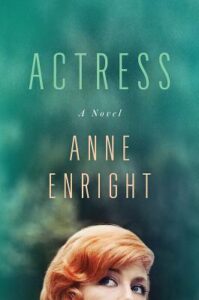 Actress: A Novel – Anne Enright – 978-1-324-00562-9 – W.W. Norton – Hardcover – 272 pages – March 3, 2020 – $26.95 – eBook version available at lower prices
Actress: A Novel – Anne Enright – 978-1-324-00562-9 – W.W. Norton – Hardcover – 272 pages – March 3, 2020 – $26.95 – eBook version available at lower prices
I think it is pretty safe to say that Anne Enright is one of the best writers of our time. Her writing is so well done that you don’t notice her deft ability to portray characters and tell their stories as if you were present at the time.
In some ways, Actress is an unusual novel, structured more like a memoir, albeit a fictional one. The story meanders the way a person might when telling a story about their parents and themselves. Ostensibly Actress is the story of Katherine O’Dell, the narrator’s mother. Norah, the daughter, is herself a writer in mid-career. But as I read the book, it became clear that this book is really about Norah, and while the daughter-mother relationship is central to her story, there are more layers than initially meet the eye here. It’s not so much a fictional portrait of an actress, but a fictional portrait of a writer.
Norah, the writer, has spent her life avoiding writing about her mother. Being the daughter of a famous, even notorious actress, is something she has tried not to deal with, even though it is the grounding of her own life story. That her mother ends up in decline is also defining for her. Katherine was a difficult, mercurial, highly private and complicated person. Her daughter, our narrator, is ultimately more like her mother than she wants to believe or accept. In Enright’s telling, the writer tells the story she must tell, even if it is not always the story she wants to tell.
Aside from being a terrific writer, Anne Enright is an outstanding conversationalist, making her a great subject for an interview. It’s pretty obvious how much I like speaking with writers about their books, and a conversation with Anne Enright is a joy. I am sure that you will enjoy listening to this interview and you will find this book well worth spending some time with. I had the pleasure to speak with her in 2015 about her last novel, The Green Road, another terrific book. Here’s a link, in case you want to listen to that conversation as well.
Anne Enright was born in Dublin in 1962, studied English and Philosophy at Trinity College, Dublin, and studied for an MA in Creative Writing at the University of East Anglia.
She has written short stories that have appeared in magazines including The New Yorker and The Paris Review. In 2004 she received the Davy Byrnes Irish Writing Award for her short story, ‘Honey’. She has published three collections of short stories.
Her novels are The Wig My Father Wore (1995), shortlisted for the Irish Times/Aer Lingus Irish Literature Prize; What Are You Like? which was the winner of the 2001 Encore Award; The Pleasure of Eliza Lynch (2002); The Gathering (2007) which won the 2007 Man Booker Prize for Fiction; and The Forgotten Waltz (2011). Her most recent novel, The Green Road (2015) won the Irish Novel of the Year.
Enright is also the author of a book of humorous essays, Making Babies: Stumbling into Motherhood (2004). She lives in Ireland.
You can buy Actress online from RJ Julia Booksellers in Madison, Connecticut where it is a current Staff Pick.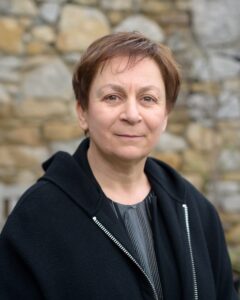
Podcast: Play in new window | Download
Brook Simons: Nothing to Write Home About
December 16, 2019 by David
Filed under Non-Fiction, WritersCast
 Nothing to Write Home About – Brook Simons – 9781626468702 – Booklocker – paperback – 232 pages – $16.95 – April 15, 2014 – ebook available at lower prices
Nothing to Write Home About – Brook Simons – 9781626468702 – Booklocker – paperback – 232 pages – $16.95 – April 15, 2014 – ebook available at lower prices
In her late twenties, in 1977, Brook Simons picked up stakes and moved to Los Angeles from Connecticut, where she grew up on a farm in a small town, which happens to be right next door to where I grew up. While Brook and I did not know each other in Connecticut, she ended up marrying an old friend of mine from Yale, who also moved to LA to start a new life just after Brook did. So while we have never met, I felt a connection to this book from the outset.
Brook’s memoir is one of the bravest and rawest pieces of personal nonfiction I have ever read. I think the word insouciant fits who Brook was during the time of this story, which coincides with the rise of the drug fueled stand up comedians who gathered in Los Angeles around the Comedy Club and television studios of Hollywood in an anxiety and angst ridden explosion of personal exposure. Not all of the funny stuff was really funny, and the mostly male community of comics was pretty solidly male-centered and frankly not only self loathing and self degrading, but extremely misogynistic.
In some ways, brash young Brook fit in with this crew, as her story shows us so evocatively and painfully. She loved the energy, the drugs, and the comedy, but she also became attached to one of the comedians with whom she developed a highly dysfunctional and brutal relationship that ultimately led her to the brink of disaster on many levels.
There really is a lot to write home about here, and Brook writes it well. I don’t want to give away the story in any form. I think you should listen to our conversation and then read the book to understand the story Brook is telling on herself toward showing how danger and power can seduce us, take us beyond the places that are safe, and sometimes cause damage that goes far beyond what anyone should be able to experience. It’s a story that antedates #MeToo, but which ought to be required reading for every woman and man who cares about changing the power relationships between male and female in a positive way.
I was really stunned by this book and hope you will find this interview of interest, along with the book itself. You can buy it from my friends at RJ Julia Booksellers in Madison, Connecticut. Support independent bookselling and order Nothing to Write Home About here.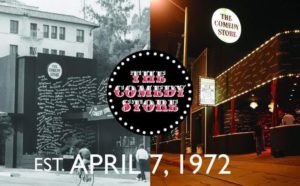
Podcast: Play in new window | Download
Ryan Leigh Dostie: Formation: A Woman’s Memoir of Stepping Out of Line
June 7, 2019 by David
Filed under Non-Fiction, WritersCast
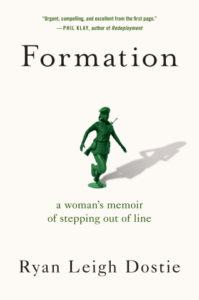 Formation: A Woman’s Memoir of Stepping Out of Line – Ryan Leigh Dostie – Grand Central Publishing – Hardcover – 978-1538731536 – 368 pages – $28.00 – ebook versions available at lower prices – June 4, 2019
Formation: A Woman’s Memoir of Stepping Out of Line – Ryan Leigh Dostie – Grand Central Publishing – Hardcover – 978-1538731536 – 368 pages – $28.00 – ebook versions available at lower prices – June 4, 2019
Ryan Leigh Dostie’s story is sometimes a painful one to read, but it is too important to not read, and this is a book I can and must recommend to all readers. Ryan comes from an unusual background. She was raised in a women-run Christian community for most of her early life. Though she wanted to be a writer, she joined the Army after high school, trained to be a linguist, and was on the more or less normal course of a teenaged woman making her way in a male dominated military force, when she was raped by another soldier in her unit.
Her memoir recounts what happened to her, what she experienced subsequently, and how she lived through and was affected by, not only her personal trauma, but the experiences she shared with other soldiers in an active deployment in Iraq, where she was part of the first wave of the American invasion in 2003. It’s a sometimes harrowing story, but also inspiring, raw and powerful, as Ryan does not flinch from showing everything she experienced and felt through a long period during and after her most powerful personal experiences in the Army.
This book does not overtly take a particular political position, despite the pain and suffering the author endured throughout her time during and after her service. But it is impossible to read this book and not be forced to think about so many of the issues around male-female relationships, power and how it is applied, the patriarchal structure that dominates our culture, and the work needed to change the way men and women interact on a daily basis.
This is the story of one woman’s journey, as such, it is thoroughly compelling, but Formation cannot fail to affect anyone who reads it, and forces us to confront our own ingrained conceptual frameworks. Not only is the memoir a story of sexual assault in the narrow sense, Ryan’s story provides a representation of how societal structures affect us all, how the individual is made to be responsible for the failures of our systems, and hopefully will help spur us all to think how we might engage in the struggle to change those structures and systems sooner than later.
I’d also add that Ryan is, has become, a very good writer. It emerges in her story that she was an aspiring novelist when she was young, and after soldiering, she went on to complete a college degree, as well as an MFA. The writing in this book is evidence of how far she has come in learning her craft.
Her “official” bio: Ryan Leigh Dostie is a novelist turned soldier turned novelist. As an Army Persian-Farsi/Dari Linguist in Military Intelligence, she was deployed to Iraq during Operation Iraqi Freedom I and II (2003-2004). She holds an MFA in fiction writing and a bachelor’s degree in History from Southern Connecticut State University. FORMATION is her first book.
It was my pleasure and honor to interview Ryan Leigh Dostie in New Haven, Connecticut, where she lives today. Her website is well worth a visit – www.ryanleighdostie.com
“Though I knew it would be urgent, compelling, and excellent from the first page, Formation was a much more expansive book than I even could have suspected: a riveting, enraging memoir from an author of remarkable toughness and emotional range. This is an unflinching and honest account of war, of homecoming, and of what happens when a woman reports an assault and the institutions around her try to smother the truth.” – Phil Klay, author of Redeployment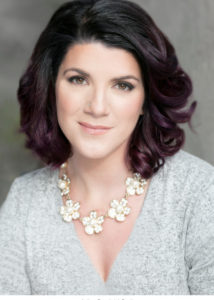
Podcast: Play in new window | Download

